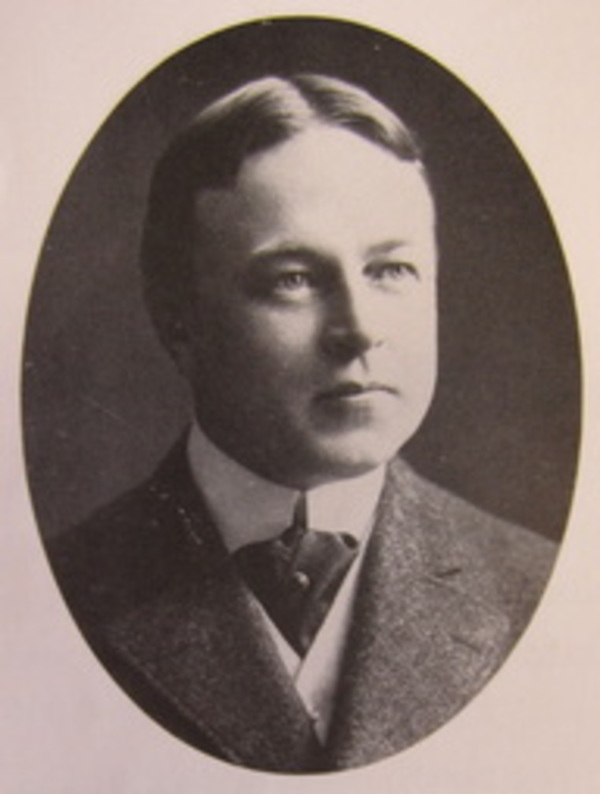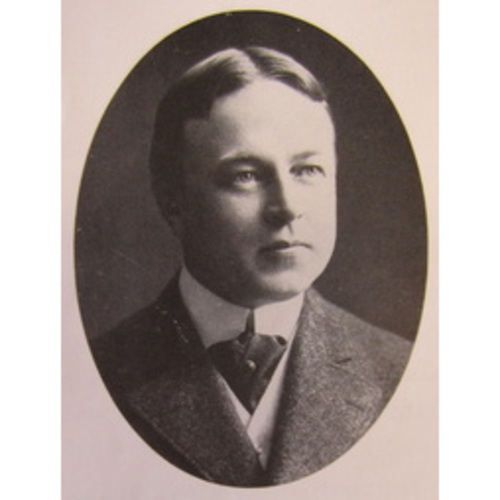
Source: Link
TURNER, ALMON PENFIELD, businessman; b. 3 July 1864 in Cleveland, Ohio, son of Almon P. Turner and Sarah M. Canfield; m. there 26 Nov. 1906 Mary Helen Harrington, and they had two daughters; d. 18 May 1917 near Oakville, Ont.
Educated in the public schools of Cleveland, Almon P. Turner then attended nearby Hiram College, graduating with a phb in 1884. His initial employment is unknown, but he worked for the Standard Oil Company in Indiana before he joined the Canadian Copper Company (CCC) of Cleveland as a bookkeeper in 1893. Ambitious and self-assured, he left Standard Oil when he failed to receive an expected promotion. His move to the CCC was probably arranged by minority shareholder Oliver Hazard Payne, former treasurer of Standard Oil and son of Henry B. Payne, one of the CCC’s largest shareholders. Henry Payne’s assistant, Henry P. McIntosh, was secretary-treasurer and the untitled chief executive officer of the company until 1902.
When Turner entered the CCC, McIntosh had just concentrated administrative control at Cleveland and reduced the office functions at operational headquarters in Copper Cliff, some three miles west of Sudbury, Ont. Turner’s responsibilities and authority expanded as McIntosh became ever more involved in the Guardian Trust Company, which he had helped organize in 1894. The transfer of Turner to Copper Cliff in November 1899 signalled a managerial shift back to this centre of mining. Although his title was assistant general manager – the general manager was James MacArthur, a difficult Scot who was more interested in his technical duties as smelter superintendent – from the outset Turner was very much in charge of the CCC’s office. Initially he lived, along with most of the management, all bachelors, in one of the boarding-houses provided by the company. He later constructed an elaborate log house (in contravention of his own rule prohibiting additional log structures in Copper Cliff) in the area west of the smelter reserved for senior management.
Turner’s transfer had been precipitated by the political threat of export restrictions on nickel-copper ores and mattes [see Samuel J. Ritchie*]. Before his arrival the CCC and the Sudbury community had been at loggerheads over the issue, with the town’s only newspaper, the Sudbury Journal edited by James A. Orr, a bitter critic of the CCC. Orr applauded both the decision in 1897 of the federal government of Sir Wilfrid Laurier to levy an export duty on nickel and the determination in 1899 of the provincial Liberal administration of George William Ross to have the mineral refined in Ontario. At the time the CCC’s refining was done by the Orford Copper Company of New Jersey.
Using his considerable charm and company patronage, Turner persuaded Orr to revise the Journal’s position. Within a year the newspaper began to publish editorials (a few of them written but not signed by Turner) against the proposed export restrictions. Employing similar tactics, he prevailed on such prominent Sudburians as hardware merchant and ex-mayor Francis Cochrane to marshal local opinion behind the company’s cause. Thanks in part to such opposition, the measures adopted by the governments were abandoned – approved by the respective parliaments but never signed into law.
The CCC became in April 1902 the chief mining and smelting subsidiary of a new nickel conglomerate, the International Nickel Company (INCO) of New Jersey. In a move that reflected his enhanced managerial role, Turner was named president of the CCC. His time in office would witness major advances in the fortunes of the CCC that contributed to INCO’s emergence as the pre-eminent nickel producer in the world. One of his first tasks was to oversee the reconstruction and expansion of the Copper Cliff smelters, which had been permitted to deteriorate by the company’s former owners in Cleveland. He was responsible too for stabilizing the CCC’s supply of ore by bringing the massive Creighton mine into production.
Politically, as a result of the Conservative victory of 1905 in Ontario, Turner faced a new minister of lands and mines, none other than Frank Cochrane, who was publicly committed to tax revisions that would let the province garner the “people’s share” of the wealth yielded by its natural resources. Negotiations between the two men led to an agreement in 1907 that fixed INCO’s tax at roughly $17,000 per annum for five years, a nominal figure given that its annual profits twice surpassed $2 million in these years. Turner was equally adept at dealing with authorities in Ottawa, fending off, for example, unwelcome enquiries in 1910 by a committee of the House of Commons about INCO’s rumoured role in a nickel cartel.
Turner was every bit as vigilant in protecting CCC/INCO interests in the Sudbury district. He had strongly supported Copper Cliff’s incorporation in 1901, partly because he thought that the CCC should be “taking steps to build up our own town” rather than “indirectly keeping up Sudbury,” but also to facilitate greater company control over community affairs, such as the appointment of a coroner who would ask fewer embarrassing questions at inquests into deaths at the mines and surface works.
Initially Turner did not intervene directly in the municipal politics of Copper Cliff, but in 1905 a slate of anti-CCC councillors headed by mayor Fred Hamilton was elected. Within months Hamilton and three associates, all of them local merchants with buildings on CCC property, were informed that their leases would not be renewed. Staunch Conservatives, the four men appealed to Cochrane, then an mpp, but his intercession resulted only in Turner agreeing that the company would pay a fair price for the buildings. Thereafter, as one-time CCC controller Frederick P. Bernhard later recalled, “the make-up of the Council was discussed and agreed on in the General Office [of the CCC] and the personnel decided upon were elected by acclamation on nomination day.”
In 1913 Turner, not yet 50, was forced to retire to a fruit farm east of Oakville by the debilitating effects of Bright’s disease, which would prove fatal. A dedicated company man, he would nevertheless continue his association with INCO until his death. After leaving Copper Cliff, he became president, with an office in Toronto, of the Huronian Company Limited, INCO’s hydroelectric subsidiary in the Sudbury district and, from 1910, its arm for the international marketing of nickel. Turner died in 1917 and was buried in Cleveland; his estate, most of it INCO stock, was valued at more than $365,000.
[The single most valuable source of information about Turner’s career is Frederick P. Bernhard’s “Historical notes on INCO” (typescript, 1953), preserved in the INCO Arch., Sudbury, Ont. Bernhard served as Turner’s stenographer from 1899 to 1904 and then worked under him again as the CCC’s controller from 1908 to 1913. Bernhard’s lengthy memoir about his life at Copper Cliff contains a wealth of detail about the company’s history during these years. r.m.b.]
AO, RG 22-380, no.55; RG 80-8-0-625, no.15629. INCO Arch., Box 940-14, corr. between Turner and INCO headquarters, New York, 1907–10; Letter-book no.5, corr. between Turner and H. P. McIntosh, 1899–1902. NA, RG 31, C1, 1901, McKim Township, Ont., div.5: 24 (rnfm, at AO). Globe, 19 May 1917. Sudbury Star, 19 May 1917. [R.] M. Bray, “A company and a community: the Canadian Copper Company and Sudbury, 1886–1902,” in At the end of the shift; mines and single-industry, towns in northern Ontario, ed. [R.] M. Bray and Ashley Thomson (Toronto and Oxford, 1992), 23–44; “The union that became INCO: Orford Copper and Canadian Copper, 1885–1902,” INCO, Background (Sudbury), March 1992: 1–8. Can., House of Commons, Select standing committee on mines, Proceedings, (Ottawa, 1910), app. Directory, Toronto, 1914–17. O. W. Main, The Canadian nickel industry; a study in market control and public policy (Toronto, 1955). H. V. Nelles, “Empire Ontario: the problems of resource development,” in Oliver Mowat’s Ontario: papers presented to the Oliver Mowat colloquium, Queen’s University, November 25–26, 1970, ed. Donald Swainson (Toronto, 1972), 189–210; Politics of development. T. H. Nicholson, ‘“A sordid boon’: the business of state and the state of labour at the Canadian Copper Company, 1890–1918” (ma thesis, Queen’s Univ., Kingston, Ont., 1991). Standard dict. of Canadian biog. (Roberts and Tunnell). [This entry contains numerous errors of fact: it confuses Turner and H. P. McIntosh in places, for example, and many of its dates are completely wrong. r.m.b.] J. F. Thompson and Norman Beasley, For the years to come: a story of International Nickel of Canada (New York and Toronto, 1960).
Cite This Article
R. Matthew Bray, “TURNER, ALMON PENFIELD,” in Dictionary of Canadian Biography, vol. 14, University of Toronto/Université Laval, 2003–, accessed December 31, 2025, https://www.biographi.ca/en/bio/turner_almon_penfield_14E.html.
The citation above shows the format for footnotes and endnotes according to the Chicago manual of style (16th edition). Information to be used in other citation formats:
| Permalink: | https://www.biographi.ca/en/bio/turner_almon_penfield_14E.html |
| Author of Article: | R. Matthew Bray |
| Title of Article: | TURNER, ALMON PENFIELD |
| Publication Name: | Dictionary of Canadian Biography, vol. 14 |
| Publisher: | University of Toronto/Université Laval |
| Year of publication: | 1998 |
| Year of revision: | 1998 |
| Access Date: | December 31, 2025 |



